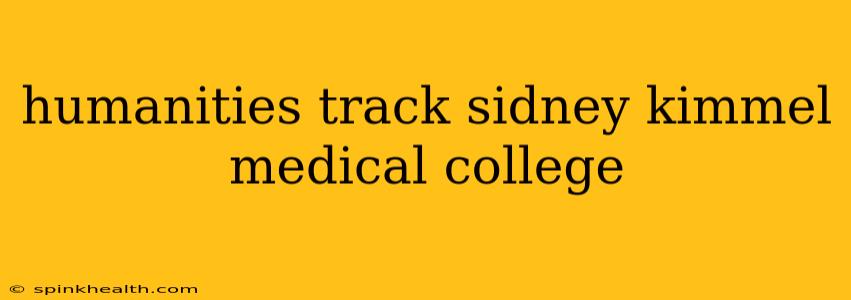The crisp white coat, the stethoscopes, the unwavering dedication—these are the iconic images associated with medical school. But at Sidney Kimmel Medical College (SKMC), there's a vibrant, often overlooked, aspect that enriches the medical training: the Humanities Track. This isn't just about adding a few extra courses; it's about cultivating a deeper understanding of the human experience, interwoven with the scientific rigor of medicine. It's about shaping compassionate, well-rounded physicians who are as adept at interpreting a patient's narrative as they are at interpreting an EKG.
My journey into understanding the SKMC Humanities Track began with a simple question: What exactly does it entail? This question, and many others, will be answered in this exploration of this unique and vital program.
What is the Humanities Track at Sidney Kimmel Medical College?
The Humanities Track at SKMC is more than a collection of electives; it's a structured program designed to complement the core medical curriculum. It’s a conscious effort to integrate the arts, humanities, and social sciences into the training of future physicians. This isn't about replacing science with philosophy, but rather enriching the scientific understanding with a deep appreciation for the human context of illness and healing. The track offers a unique blend of courses and experiences designed to foster critical thinking, empathy, and communication skills – crucial attributes for effective patient care.
What courses are offered in the Humanities Track?
The specific course offerings within the Humanities Track may vary from year to year, but the core principles remain consistent. Typically, the track incorporates courses exploring:
-
Medical Ethics: Students grapple with complex ethical dilemmas inherent in modern medicine, preparing them for the difficult decisions they will inevitably face. This might include discussions on end-of-life care, resource allocation, and patient autonomy.
-
Medical History: By understanding the evolution of medical practices and theories, students gain a broader perspective on the present state of medicine and the challenges that lie ahead.
-
Literature and Medicine: Exploring literary works that depict illness, suffering, and healing provides a powerful lens through which to view the patient experience.
-
Bioethics: This delves deeper into the philosophical and ethical underpinnings of medical practice, often examining societal impacts and legal considerations.
-
The Arts in Medicine: This might involve exploring the therapeutic power of art or analyzing how visual arts can enhance communication and understanding between physicians and patients.
These courses aren't simply lectures; they encourage active participation, discussion, and critical analysis, fostering a collaborative learning environment.
How does the Humanities Track benefit medical students?
The benefits extend far beyond simply ticking boxes on a curriculum. The Humanities Track cultivates essential qualities for future physicians:
-
Enhanced Empathy and Communication: By exploring the human experience through various lenses, students develop a deeper understanding of their patients’ emotions, beliefs, and concerns. This translates to improved communication and a more patient-centered approach to care.
-
Improved Critical Thinking Skills: The rigorous analysis and discussion inherent in humanities courses sharpen critical thinking abilities, which are invaluable in diagnosing complex cases and making informed decisions.
-
Stronger Ethical Foundation: Grappling with ethical dilemmas prepares students to navigate the complex moral considerations they'll encounter throughout their medical careers.
-
Holistic Approach to Patient Care: The track fosters a holistic view of health, recognizing the interplay between physical, emotional, and social factors.
What are the admission requirements for the Humanities Track?
This will vary; you’ll need to check the official SKMC website for the most up-to-date details. It usually involves applying during a specific period and may include submitting a statement of interest or participating in an interview.
Is the Humanities Track required for graduation from SKMC?
No, it's typically an elective track. However, the enrichment it offers is significant for those seeking to become well-rounded physicians who prioritize patient well-being and effective communication. It's a testament to SKMC’s commitment to nurturing compassionate and insightful medical professionals.
In essence, the Humanities Track at Sidney Kimmel Medical College is not merely an add-on; it’s a transformative element in the medical education experience, preparing future physicians not only to treat diseases but to heal hearts and minds. It is a vital thread woven into the fabric of becoming a truly exceptional doctor.

